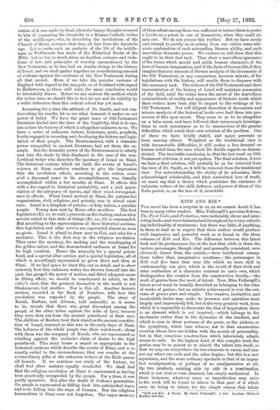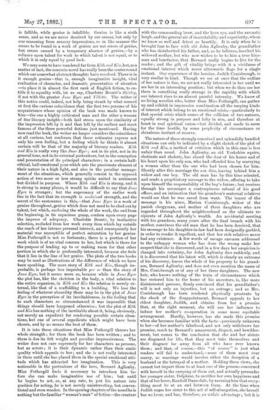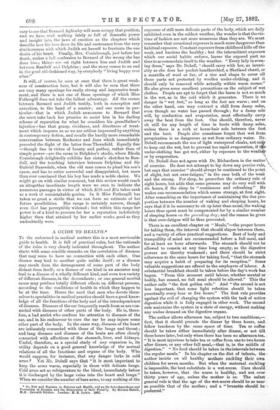KITH AND KIN.* Tun novel has been a surprise to
us, as we cannot doubt it has been to many other readers. Miss Fothergill's previous fictions, The First Violin and Probation, were noticeably clever and inter- esting books, and were characterised throughout by a very refresh- ing individuality of treatment ; but there was little, if anything, in them to lead us to expect that their author would produce such impressive and powerful work as is found in the three volumes of Kith and Kin. The difference between this latest book and its predecessors lies in the fact that while in them the various personages, though vital and generally consistent, were obviously drawn from the outside,—were intellectual concep- tions rather than imaginative creations,—the personages in Kith and Kin have that true life which no mere skill in craftsmanship can give, which is the result of that vivid and utter realisation of a character external to one's own, which distinguishes the creative from the constructive faculty,—the work of genius from the work of talent. Now, Miss Fothergill's latest novel must be broadly described as belonging to the class of works of genius ; but no artistic achievement is ever the out- come of genius pure and simple. The creative, instinctive, and incalculable factor may make its presence and operation most largely and impressively felt, but in the very greatest work, from which it is impossible to dissociate the idea of inspiration, there is an element which is not inspired,—which belongs to the mechanics rather than to the dynamics of the intellect, and which is seen in those portions of the poem, or the picture, or the symphony, which bear witness, not to that unconscious creation whose laws are hidden with the secrets of personality, but to that conscious construction which laboriously adapts means to ends. In the highest kind of this complex work the genius may be so potent as to absorb the talent into itself, so that we may see everywhere the two elements in union, and can- not say where one ends and the other begins ; but this is a rare experience, and the more ordinary spectacle is that of an imper- fect amalgamation, or perhaps of no amalgamation at all, the two products existing side by side in a combination which is not vital or even chemical, but simply mechanical. In these instances, whatever error or imperfection may exist in the work will be found to inhere in that part of it which owes its being to talent, for the simple reason that talent
* Kith and Kin. A NoveL By Jessie Futhergill. 3 vols. London : Richard Bentley and Son.
is fallible, while genius is infallible. Genius is like a sixth sense, and as we are never deceived by our senses, but only by our reasoning from sensory impressions, so in like manner the errors to be found in a work of genius are not errors of genius, but errors caused by a temporary absence of genius,—by a reliance upon talent for work to which talent is not equal, or to which it is only equal by good luck.
We may seem to have wandered far from Kith and Kin, but, as a matter of fact, the concrete novel has really been the centre round which our somewhat abstract thoughts have revolved. There is in it enough genius—that is, enough imaginative insight, vital realisation of character, and dramatic presentation of situation —to place it in almost the first rank of English fiction, to en- title it to equality with, let us say, Charlotte Bronto's Shirley, if not with the greater Jane Eyre and Villette. The writer of this notice could, indeed, not help being struck by what seemed at first the curious coincidence that the first two persons of his acquaintance whose opinion of the book was made known to him—the one a highly cultivated man and the other a woman .of fine literary insight—both laid stress upon the similarity of the impression left by it and that left by the earliest and most famous of the three powerful fictions just mentioned. Having now read the book, the writer no longer considers the coincidence at all curious, but confesses that these estimates express not only his own feeling, but a feeling which he thinks it almost certain will be that of the majority of literary readers. Kith and Kin is really very like Jane Eyre; not in its plot, not in its general tone, not in its external portraiture, but in the conception and presentation of its principal characters ; in a certain half- ethical, half-emotional pose which sets the passionate element of their nature in a high light, and also in the peculiar manage. ment of the situations, which generally consist in the opposed action of two more or less strong spirits united in sentiment but divided in purpose. Where Kith, and Kin is strong, and it is strong in many places, it would be difficult to say that Jane Eyre is stronger; but the supremacy of the earlier work lies in the fact that its strength is sustained strength, and the secret of the sustenance is this,—that Jane Eyre is a work of genius throughout, genius which does not need to be eked out by talent, but which, enclosing the whole of the work, the end from the beginning, in its capacious grasp, confers upon every page the impress of adequacy. Charlotte Bronte, by instinctive selection, excluded from her work every item which lay outside the reach of her intense personal interest, and consequently her material was susceptible of perfect saturation by her genius. Miss Fothergill is not so fortunate; there is a portion of her work which is of no vital concern to her, but which is there for the purpose of leading up to or making room for that other portion in which she is profoundly interested, because she feels that it lies in the line of her genius. The plots of the two books may be used as illustrations of the difference of which we have been speaking. The mere story of Kith and Kin, though im- probable, is perhaps less improbable per se than the story of Jane Eyre, but it seems more so, because while in Jane Eyre the plot has, like the skeleton in the body, a vital relation to the entire organism, in Kith. and Kin the relation is merely ex- ternal, like that of a scaffolding to a building. We lose the feeling of whatever absurdity there may be in the plot of Jane Eyre in the perception of its inevitableness, in the feeling that to such characters so circumstanced it was impossible that things should have happened otherwise ; but the plot of Kith and Kin has nothing of the inevitable about it, being, obviously, not merely an expedient for rendering possible certain situa- tions, but one of several expedients which might have been chosen, and by no means the best of them.
It is into these situations that Miss Fothergill throws her whole strength ; for them the book has been written ; and to them is due its felt weight and peculiar impressiveness. The writer does not care supremely for her characters as persons, but as actors ; it is their dynamic rather than their static quality which appeals to her; and she is not really interested in them until she has placed them in the special emotional atti- tude which has attracted her imagination. This is very noticeable in the portraiture of the hero, Bernard Aglionby. Miss Fothergill finds it necessary to introduce him be- fore she can make imaginative use of him; but until he begins to act, or, at any rate, to put his nature into position for acting, he is not merely uninteresting, but conven- tional and even wooden. In the opening chapters of the novel he is nothing but the familiar " woman's man" of fiction—the creature
with the commanding brow, and the keen eye, and the sarcastic laugh, and the general air of inscrutability and superiority, whom we know so well and detest so heartily. It is only when he is brought face to face with old John Aglionby, the grandfather who has disinherited his father, and, as he believes, insulted his widowed mother, but who now wishes to be to him a true kins- man and benefactor, that Bernard really begins to live for the reader ; and the gift of vitality brings with it a vividness of emotional interest which never afterwards flags for a single instant. Our experience of the heroine, Judith Conisbrough, is very similar in kind. Though we see at once that the outline of her nature is fine, we are not really interested in her until we see her in an interesting position ; but when we do thus see her there is something really strange in the rapidity with which our interest rises to an almost painful intensity. We know of no living novelist who, better than Miss Fothergill, can gather up and exhibit in impressive combination all the varying kinds of interest which belong to an emotional crisis,—particularly to that special crisis which comes of the collision of two natures, equally strong in purpose and lofty in aim, and therefore at heart in real spiritual union—but divided, and made to seem for the time hostile, by some perplexity of circumstance or chivalrous instinct of reserve.
The nature of these strongly conceived and splendidly handled situations can only be indicated by a slight sketch of the plot of Kith and Kin, a method of criticism which in this case is less unfair than usual. John Aglionby, an old Yorkshire squire, obstinate and choleric, has closed the door of his house and of his heart upon his only son, who had offended him by marrying a woman other than the one who had been chosen for him. Shortly after this marriage the son dies, leaving behind him a widow and one boy. The old man has by this time relented, and sends a propitiatory message to the widow, offering to take upon himself the responsibility of the boy's future ; but receives through his messenger a contemptuous refusal of his good offices, and an intimation that his grandson's maternal relatives would see that he was saved from want. The bearer of the message is his niece, Marion Conisbrough, widow of the parish clergyman, and mother of three daughters who are regarded throughout the neighbourhood as the ultimate re- cipients of John Aglionby's wealth. An accidental meeting with his grandson, many years after the final breach with his mother, convinces the old man that he has been deceived, that his message to his daughter-in-law had been designedly garbled, in order to render it repellent, and that her rich relatives never had any existence. A few words of savage sarcasm addressed to the unhappy woman who has done the wrong make her suspect that she is discovered, and in a few days her suspicion is changed into certainty, for John Aglionby dies suddenly, and it is discovered that his latest will, which is clearly an outcome of his discovery, leaves the whole of his property to his grand- son, Bernard Aglionby, and does not even mention the name of Mrs. Conisbrough or of any of her three daughters. The new heir, who knows nothing of the train of circumstances which has restored him to the home of his ancestors, is, like more disinterested persons, firmly convinced that his grandfather's will is not only an injustice, but an outrage ; and as Mrs. Conisbrough has been rendered physically prostrate by the shock of the disappointment, Bernard appeals to her eldest daughter, Judith, and obtains from her a promise that, at the right moment, she will use her influence to induce her mother's co-operation in some more equitable arrangement. Hardly, however, has she made this promise when she becomes familiar with the facts—previously unknown to her—of her mother's falsehood, and not only withdraws her promise, much to Bernard's amazement, disgust, and bewilder- ment, but comes to the conclusion that she and her sisters are disgraced for life, that they must take themselves and their disgrace far away from all who have ever known them ; and that, of course,—this "of course" is just what readers will fail to understand,—none of them must ever marry, as marriage would involve either the deception of a husband or the betrayal of a mother. Holding these views, she cannot but impart them to at least one of the persons concerned with herself in the carrying of them out, and actually persuades her younger sister, Delphine, to sacrifice her own happiness and that of her lover, Randulf Danesdale, by assuring him that every- thing must be at an end between them. At the time when Judith urges her sister to this act of self-abnegation, she herself has no lover, and has, therefore, an unfair advantage ; but it is
easy to see that Bernard Aglionby will soon occupy that position, and we have read nothing lately so full of dramatic power and insight into the laws of emotion as the chapters which describe how his love drew its life and sustenance from the very stubbornness with which Judith set herself to frustrate the one desire of his heart. Finally, Mrs. Conisbrough, just before her death, makes a full confession to Bernard of the wrong she has done him ; thing are set right between him and Judith and between Randall and Delphine ; and the story comes to an end in the good old-fashioned way, by everybody " living happy ever after."
It will, of course, be seen at once that there is great weak- ness of construction here, but it will also be seen that there are very many openings for really strong and impressive treat- ment, and there is not one of these openings of which Miss Fothergill does not take the fullest advantage. All the scenes between Bernard and Judith testify, both in conception and execution, to the hand of a master ; and one scene in par- ticular—that in which Judith announces to Bernard that she must take back her promise to assist him in his darling scheme of reparation for what he considers his grandfather's injustice—has that grasp, vividness, and directness of treat- ment which impress us as we are seldom impressed by anything in contemporary fiction, and recalls the hardly more remarkable conversation between Rochester and Jane which immediately preceded the flight of the latter from Thornfield. Equally fine —though fine in virtue of beauty and pathos, rather than of simple power—are the scene in Delphine's studio, where Rhoda Conisbrough delightedly exhibits her sister's sketches to Ran- dulf, and the touching interview between Delphine and Sir Gabriel Danesdale, when the old man comes to plead his son's cause, and has to retire sorrowful and disappointed, but more than ever convinced that his boy has made a noble choice. We might go on with similar comment, but this review would reach an altogether inordinate length were we even to indicate the numerous passages in virtue of which Kith and Kin takes rank as a work of unmistakable genius. In it Miss Fothergill has taken so great a stride that we can form no estimate of her future possibilities. Her range is certainly narrow, though even that has perceptibly widened ; but within this range her power is of a kind to procure for her a reputation indefinitely higher than that attained by her earlier works, good as they undoubtedly were.




































 Previous page
Previous page